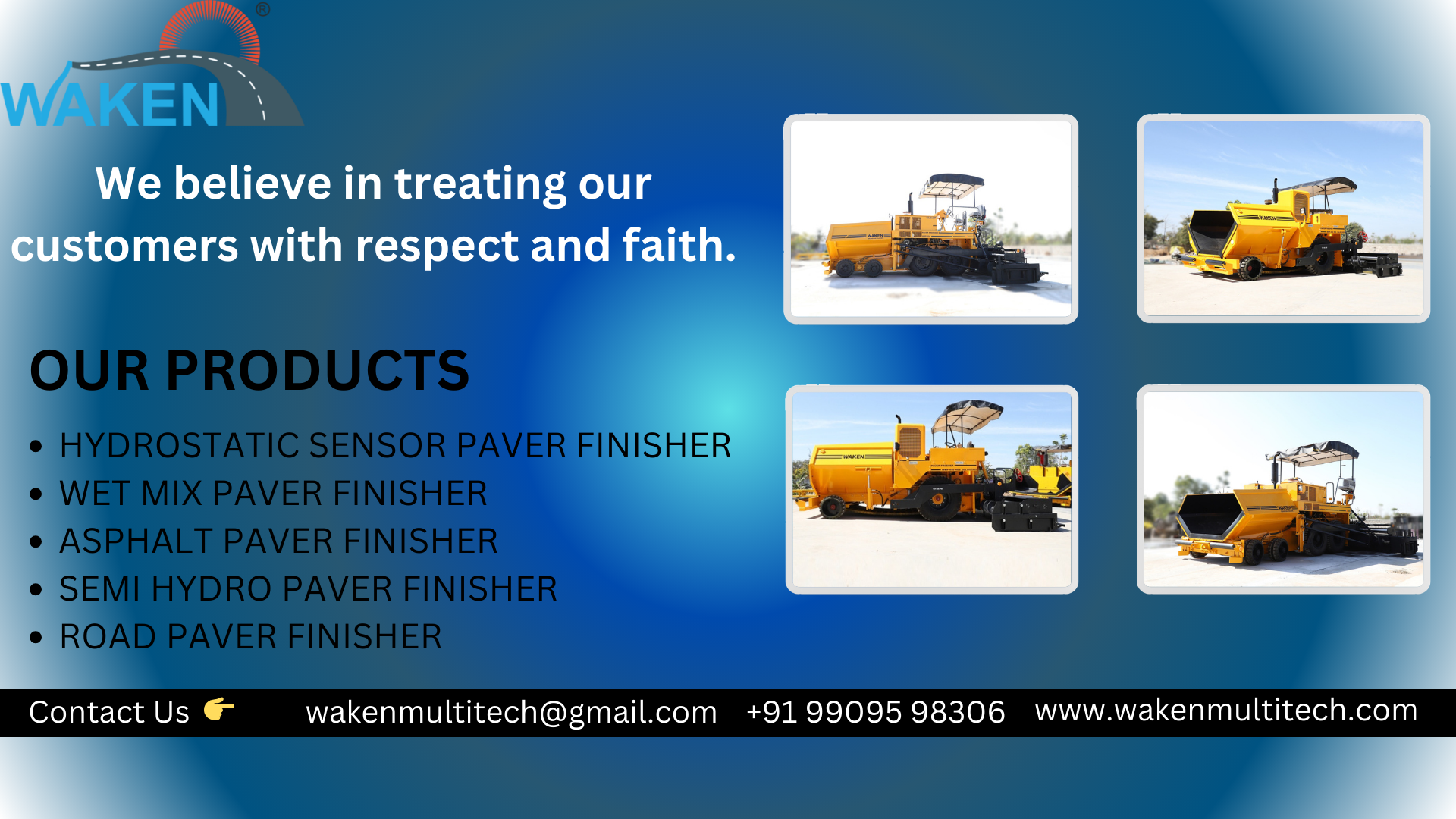Introduction to Hot Mix Paver Machine
Hot Mix Paver Machines are engineered to lay asphalt evenly, delivering durable, smooth road surfaces across Indian highways, city streets, and industrial parks. They combine precise screed control, robust conveyors, and tracked or wheeled mobility for consistent mat quality. Modern pavers integrate sensors and automation to reduce rework and fuel waste. Contractors prefer machines that balance output with easy maintenance, ensuring dependable performance in varied climates. Learn more on our official website for solutions that fit local specifications and project timelines.
Working Principle and Process Flow of Hot Mix Paver Machine
Hot mix is delivered to the paver’s hopper, where conveyors feed material to the augers. Augers spread mix uniformly before the vibratory screed compacts and levels to the target thickness. Grade and slope sensors maintain profile accuracy while heating systems keep mix workable. Operators control paving width, speed, and crown to match design. Final rolling achieves density and texture requirements. Explore compatible equipment on the Waken Multitech site to streamline logistics, compaction sequencing, and temperature management for consistent results.
Types of Hot Mix Paver Machine
- Wheeled pavers for urban projects needing fast relocation, smooth rides, and minimal surface disturbance during frequent site moves.
- Tracked pavers suited to highways and heavy-duty bases, offering superior traction, flotation, and stability on challenging subgrades.
- Sensor-equipped pavers with automatic grade and slope control for precise profiles, excellent ride quality, and lower corrective work.
- Hydraulic extendable screed pavers enabling flexible width adjustments, faster setup, and seamless transitions across varying lane configurations.
- High-capacity pavers optimized for continuous feed operations, delivering strong throughput and uniform mats on expressways and airports.
Key Features and Specifications of Hot Mix Paver Machine
- Variable paving width with hydraulic extensions supporting common Indian lane and shoulder dimensions.
- Precision grade and slope sensors maintain target profile, improving ride quality and reducing rework.
- Efficient material conveyors and augers ensure uniform distribution and steady head of material.
- Vibratory, heated screed with adjustable frequency for compaction and excellent texture control.
- User-friendly controls, accessible service points, and reliable powertrain designed for tough sites.
Applications of Hot Mix Paver Machine
- National and state highways requiring uniform thickness, superior density, and smoothness to sustain heavy traffic, monsoon exposure, and long maintenance cycles while meeting IRC specifications and concessionaire performance indicators.
- Urban streets, BRT corridors, and industrial estates where rapid mobilization, minimal disruption, and consistent mat temperature improve productivity, reduce closures, and deliver safer driving comfort for commuters and logistics fleets.
- Airport runways, taxiways, and aprons needing tight tolerances, high bearing capacity, and excellent surface texture to support aircraft loads, braking efficiency, and nighttime operational safety under strict quality control.
- Rural connectivity, PMGSY roads, and district projects emphasizing cost efficiency, fuel savings, and reliable compaction to enhance accessibility, reduce travel time, and support local economic development initiatives sustainably.
Benefits of Using Hot Mix Paver Machine
- Higher ROI through reduced rework, optimized fuel use, and longer pavement life, achieved by uniform distribution, accurate screed control, and better temperature retention across varying site conditions.
- Improved quality consistency with sensor-based grade and slope management, delivering smoother profiles, precise thickness, and dependable compaction outcomes aligned with Indian codes and client KPIs.
- Significant time savings from rapid width adjustments, steady material flow, and intuitive operator interfaces, enabling faster project turnover and better coordination with plant and roller fleets.
- Scalable performance across small municipal jobs to expressway corridors, with safety-focused controls, better visibility, and compliance-ready outputs supporting audits and contractual documentation.
Top Manufacturers and Suppliers in India
India’s market for Hot Mix Paver Machines includes established domestic producers and global brands offering localized support. Buyers typically evaluate screed technology, sensor packages, mobility type, and after-sales coverage. Suppliers often provide operator training, spares availability, and commissioning assistance. Common specifications include hydraulic extendable screeds, electronic grade controls, reliable powertrains, and robust conveyors. Many vendors maintain regional service points to minimize downtime. Comparing lifecycle costs, warranty terms, and compatibility with regional asphalt plants helps contractors select dependable pavers that match highway, urban, or airport project requirements nationwide.
Maintenance and Safety Tips
- Inspect conveyors, augers, and screed daily; verify fasteners, wear parts, hoses, and safety guards.
- Clean material build-up and lubricate bearings, chains, and pivot points per OEM schedules.
- Calibrate grade and slope sensors regularly; verify screed temperature and vibration settings.
- Train operators on safe loading, signaling, visibility, and emergency shut-off procedures.
- Stock essential spares and store machines under cover to protect electronics and hydraulics.
FAQs – Hot Mix Paver Machine
Contact Details
Talk to our specialists today for tailored solutions and fast assistance.
